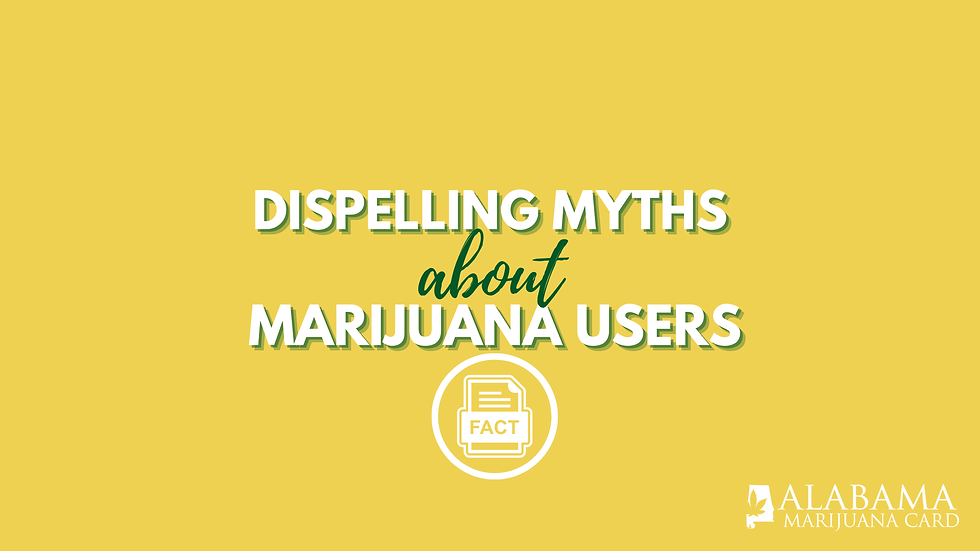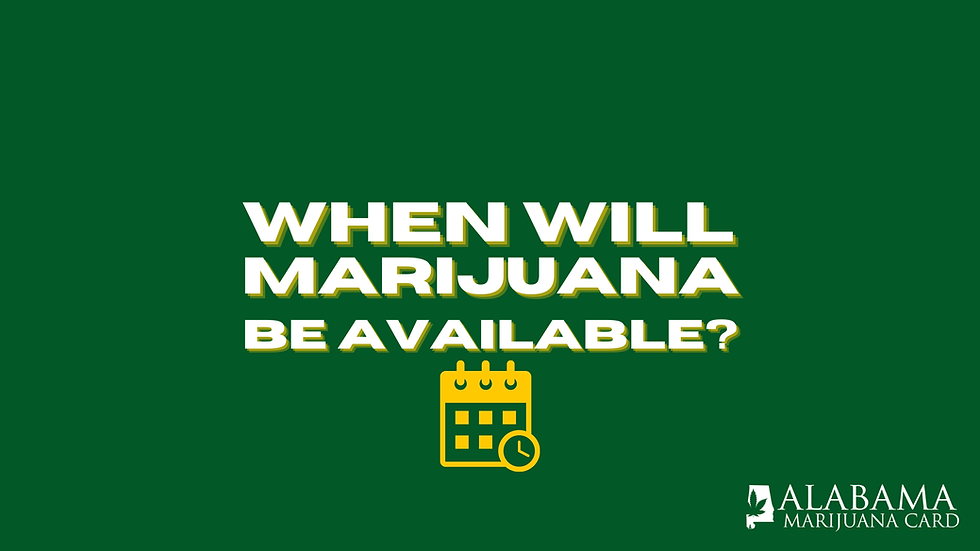Debunking Myths About the Modern Medical Marijuana User: Who Uses Medical Marijuana?
- D. H. Reilly
- Jun 11, 2021
- 6 min read

Most people who use marijuana do not fit the stereotype.
There is a problem with medical marijuana, and that problem is that some people have a problem with it—even though they might truly benefit from medical marijuana and the relief it has to offer.
It may seem strange to say that there is still a stigma about medical marijuana. After all, medical marijuana is legal in 36 states, and 91% of Americans support legalizing it.
But still the stigma exists, which deters some people from finding relief from painful or difficult-to-manage conditions.
We here at Alabama Marijuana Card believe passionately in helping those who are suffering from conditions that medical marijuana can treat, and so we thought it was past time to dispel some of the myths and misunderstandings about the kinds of people who use medical marijuana.
Roll Tide on Ending Stereotypes Related to Medical Marijuana
Of course when marijuana was an unstudied, misunderstood medicine, it was easy to write off those who used it as counterculture kids trying to be cool and chasing a high.
But shouldn’t Alabamans have a little more sympathy for harmful effects of inaccurate stereotypes? After all, not everyone in the Yellowhammer State lives out in the country with a lawn full of pickup trucks, nor do most of them fit any of the other ignorant cliches about living in Alabama.
I’m sure you’ve heard someone at some point in your life say something like “Really? You’re from Alabama? That’s surprising, because…” followed by some offensive comment or other.
Of course, that’s how stereotypes work: If you don’t know any better, you’re more likely to subscribe to a stereotype, and when you do know better, you’re more likely to change your mind. The same is true of medical marijuana. People who have no experience with it are more likely to buy into the stereotypes.
Familiarity Breeds Acceptance for Medical Marijuana in Alabama
Consider, for example, the story of Carly Chandler and her father Dustin. The first major stop in Alabama’s road to medical marijuana legalization began with Carly.
When she was 3-year-old, Carly’s parents, desperate to find relief for their daughter’s severe epilepsy, sought the right to give her CBD. Eventually their efforts led to Carly’s Law, which legalized CBD oil with up to 3% THC for those with a “debilitating epileptic condition” who had exhausted other treatment options without success.
Dustin Chandler told Birmingham CBS affiliate WIAT that he had not always supported legalizing medical marijuana, but then he saw what it did for his daughter. He said Carly’s situation has gotten dramatically better since they have started treating her with CBD and THC.
“I think it really opened my eyes to it,” Chandler said about how his family’s experience with CBD oil changed his perspective on the issue of medical marijuana. In fact, Chandler went on to work publicly and tirelessly to help pass SB 46, the law that legalized medical marijuana in Alabama.
“We’ve got to get rid of the stigma cannabis has had,” Chandler said to WIAT. “If there are people that truly need medical cannabis, we have to look at the best ways, safe, responsible ways to allow them to have access to it.”
Chandler told the Opelika Observer that “My entire reason to get involved was to help more people. So helping pass two different bills related to CBD and cannabis has definitely been tiring, however well worth it if Alabamians get help.”
Informed Legislators Also Come Around on Medical Marijuana
Lawmakers have also had their eyes opened by becoming more familiar with the real and immense health benefits that medical marijuana can offer. State Senator Paul Sanford went from staunch opponent of legalization to joining the fight to pass SB 46.
Sanford told the Alabama Media Group that his perspective on marijuana was flipped after meeting with desperate Alabamian families who had exhausted all legal treatments only to see their children continue to suffer.
"When you meet one of the families, and you see their children and you see the pain in the eyes of those parents and then put myself in their shoes and realize how blessed I am and how much strength that those families show for the situations that they have, how could I not help them?" Sanford said.
Loving families and compassionate legislators working together to alleviate suffering. Doesn’t that sound a little more like the Alabama you know than those trailer-park stereotypes?
So What do we Know About Medical Marijuana Patients?
So if supposedly backwoods Alabamans are actually compassionate and open-minded, then who are medical marijuana patients?
Well answering that question can be a little tricky, as 1) there is still a limited amount of research being done in regards to marijuana in the U.S. because of its prohibition on the federal level and 2) most of the research that is being done is focused on cannabis as a medicine, not on who uses that medicine. Still, let’s look at what we do know.
Researchers in one study examined first-time applicants for medical marijuana cards, and said the findings revealed “a somewhat unexpected profile of [...] users of America's most popular illegal drug” and raised “questions about some of the basic assumptions held by both proponents and opponents of current policy.”
Medical Marijuana Patients are Educated
Let’s start with educational attainment. Far from being burnouts who never finished high school, the study participants compared favorably overall to the general population, with medical marijuana patients having lower high school dropout rates and a higher percentage of graduates than national averages.
Oddly, the percentages of marijuana patients who had earned bachelors' degrees and doctorates were nearly identical to the national average, but only about half as many marijuana patients had earned masters' degrees.
Marijuana Isn’t a Gateway Drug
The researchers also learned that nearly every single one of the patients they had interviewed had used marijuana illegally in the past, and that a whopping 85% of them admitted to using other illegal drugs at some time. That finding could on the surface seem to suggest that not all stereotypes about drugs are misleading, and that medical marijuana users are just drugged-up burnouts chasing a high.
But not so fast! A majority of those with past drug use did not continue to use those drugs, except for marijuana, after a period of experimentation in their youth. The researchers found nothing to support the old chestnut about marijuana being a gateway drug, and argued that giving up on more potent narcotics but continuing to use marijuana to treat medical conditions suggests that it is indeed the medicinal value of marijuana that patients are interested in.
Another research team also found that the gateway idea is a myth, and what’s more they learned that medical marijuana users are far more likely to be employed than the general population. That probably has a lot to do with the cost of medications in general, but the fact remains that it doesn’t fit the stereotype of a pothead.
Medical Marijuana is a Legitimate Treatment Option
Perhaps more important than the demographics of medical marijuana patients is that study after study (see this one, for example) has reported that they overwhelmingly believe that cannabis has brought them relief from their suffering. They also overwhelmingly express satisfaction with nearly every aspect of the medication besides its cost, and many of them report relying less on other prescription medications when they can access medical marijuana.
Who are Medical Marijuana Patients?
As we’ve said, there isn’t a wealth of research in this area, and so researchers’ initial findings may be revised upon more study, but so far, here is what researchers think they know about medical marijuana patients: They’re well educated, employed, using marijuana in a genuine effort to alleviate their medical conditions.
Most importantly, the research shows that effort is paying off: These patients report feeling happier and healthier thanks to medical marijuana. Medical marijuana eases pain and suffering and delivers results. Isn’t that what really matters? And wouldn’t you like to experience the same?
Don’t Let Myths Keep You From Finding Relief
Alabama’s medical marijuana isn’t open yet, but that doesn’t mean you can’t get started on your own medical marijuana journey.
Reserve an appointment today. As soon as we’re cleared to start making appointments, you’ll be matched up with one of our knowledgeable, sympathetic doctors. Together, you’ll decide if medical marijuana is right for you. You can even meet via a telemedicine appointment and get approved without even leaving your home!
Sign up today, and not only will you receive $25 off of your evaluation, but you’ll be one of the first people to get an Alabama Marijuana Card!
Doctors Who Care. Relief You Can Trust.
At Alabama Marijuana Card, our mission is helping everyone achieve wellness safely and conveniently through increased access to medical marijuana. Our focus on education, inclusion, and acceptance will reduce stigma for our patients by providing equal access to timely information and compassionate care.
If you have any questions, call us at (833) 781-5633, or simply reserve a medical marijuana evaluation to start getting relief you can trust today!
Check out Alabama Marijuana Card’s Blog to keep up to date on the latest medical marijuana news, tips, and information.



Comments